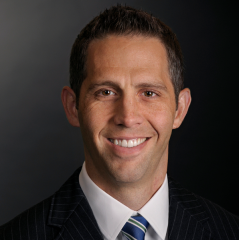Like many research projects, Michael Baer’s latest study was inspired by personal experience.
Baer, an assistant professor of management at the W. P. Carey School of Business, and a former colleague were unhappy about an unfair supervisor at their workplace — which was not Arizona State University, he adds.
“It was, objectively, an unfair situation,” he said. “But we realized that we kept talking about it and kept revisiting it, and one day we said, ‘This is not helping. This is making things worse.’
“The more we talked about it, the more we disliked the supervisor and the less we were able to get over it.”
Michael Baer
So that inspired Baer’s new study with several co-authorsHis co-authors were Rashpal K. Dhensa-Kahlon of the University of Surrey; Ryan Outlaw of Indiana University, and Jessica B. Rodell, Jason A. Colquitt, Kate P. Zipay and Rachel Burgess, all of the University of Georgia., based on a cleverly designed experiment that found that complaining about an unfair supervisor to co-workers can end up hurting an employee’s performance.
“This is one of my favorite studies because the general intuition is that when something bad happens, your natural inclination is to talk to other people about it, to make sense of it and get some clarity and emotional support,” he said.
Their study cited research showing that people who had talked about their anger would do it again because they perceived it as helpful.
But Baer’s study found that complaining decreases forgiveness for the unfair event, and it can decrease a person’s performance by hindering “citizenship,” or the desire to help the supervisor.
And what about the co-worker you’re complaining to?
“The inclination is to go to people who agree when you complain and who will say, ‘Wow you really got the short end of the stick,’ ” he said.
“But we looked at if you have a co-worker who reframes the situation, saying, ‘Maybe there was a reason for that,’ ‘Maybe things aren’t so bad’ or ‘What was your part in it?’ ”
Listeners who are passive don’t help the situation, but if complainers talk to someone who “reframes” the situation — looking at it from a different perspective — that can nullify all the negative effects of talking about unfairness, the study found.
The team of researchers did two studies, one using surveys and one in a lab. The first study surveyed 170 bus driversThe journal article quotes one bus driver: “We are treated with contempt. … The customer is not always right. We have several managerial staff who can’t even drive a car, let alone a bus, try and tell us how to do our jobs.” and 25 supervisors in London. The drivers were asked to rate their perceptions of unfairness on the job, their anger and hope, how they talked about that with co-workers, how the co-workers responded and whether they forgave their supervisors. The supervisors were asked how much the workers helped them.
The results found that talking about a supervisor’s unfairness “can be detrimental in terms of increased anger and decreased hope — which hinder employees’ ability to ‘move on’ from the experience,” according to the study, which is set to appear in the Academy of Management Journal. And listeners can mitigate the bad effects by reframing.
The researchers then wanted to replicate the results in a laboratory, so they recruited 105 college students who were asked to bring a friend to the experiment, which was set up this way:
The students were assigned to be the “talkers,” and their friends were assigned to be “listeners.”
The “talkers” were given a task and told that their performance would determine how much class credit they received. Before the task time was up, the experimenter rudely interrupted them and then marked some of their correct answers as incorrect — creating an “unfair” situation.
At the same time the listeners were getting briefed in how to respond. The pairs were reunited and the listener either just listened, saying little, or reframed the situation by saying, “Maybe there’s a way to deal with this,” or “Maybe she was having a bad day.”
The “talkers” also were asked to rate their forgiveness levels.
At the end, the experimenters who created the unfair scenario asked the talkers to clean up the room.
“The ones who didn’t forgive did very little cleanup, while the ones who did forgive actually cleaned up. That’s how we tested willingness to help,” Baer said.
The lab study reinforced the results of the first study: Talking about unfairness increases anger, decreases hope, hinders the complainer from “moving on,” makes it difficult to forgive the supervisor and decreases the complainer’s helpfulness to the supervisor. But co-workers who respond by reframing the situation can lessen these effects.
The article says that “reframing” by a co-worker does not mean a dismissive “get over it,” but rather it includes expressing concern and suggestions for coping.
“I don’t think any of these people were conscious of the fact that they were pulling back and exhibiting their anger,” Baer said of the study subjects.
“So yes, talk about it, but be careful who you talk to, and at some point you have to cut it off.”
More Science and technology

ASU-led space telescope is ready to fly
The Star Planet Activity Research CubeSat, or SPARCS, a small space telescope that will monitor the flares and sunspot activity of low-mass stars, has now passed its pre-shipment review by NASA.…

ASU at the heart of the state's revitalized microelectronics industry
A stronger local economy, more reliable technology, and a future where our computers and devices do the impossible: that’s the transformation ASU is driving through its microelectronics research…

Breakthrough copper alloy achieves unprecedented high-temperature performance
A team of researchers from Arizona State University, the U.S. Army Research Laboratory, Lehigh University and Louisiana State University has developed a groundbreaking high-temperature copper alloy…



